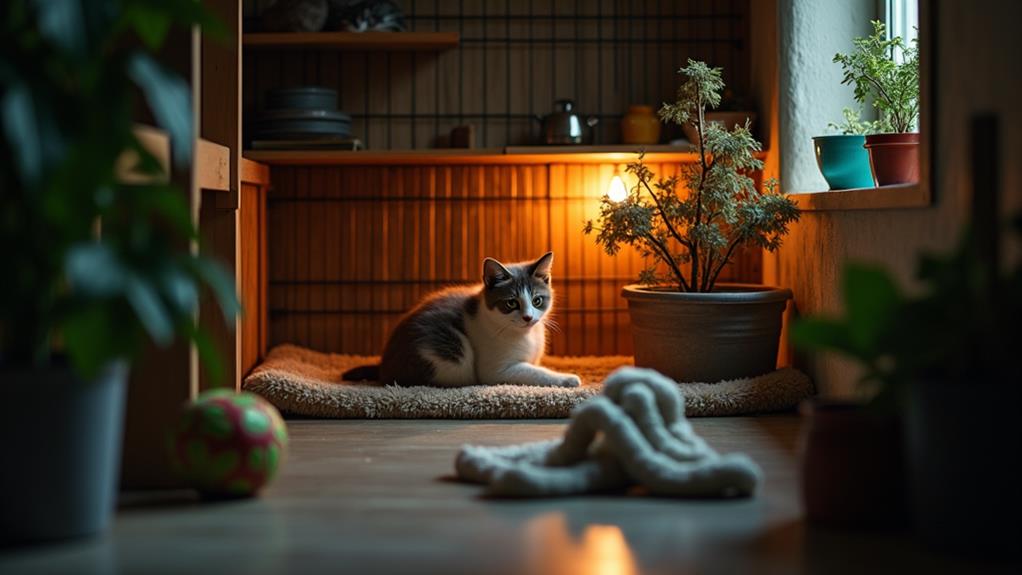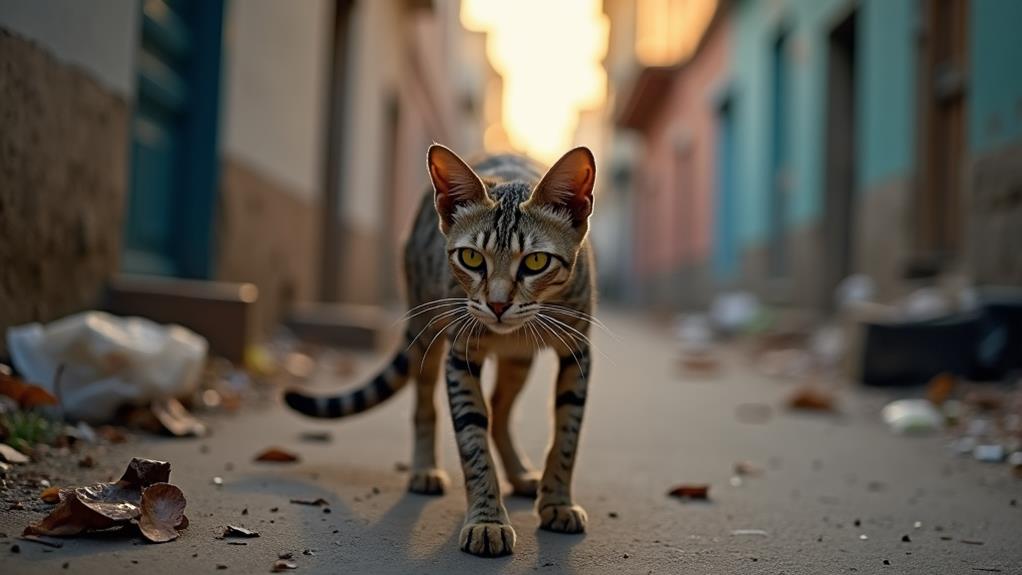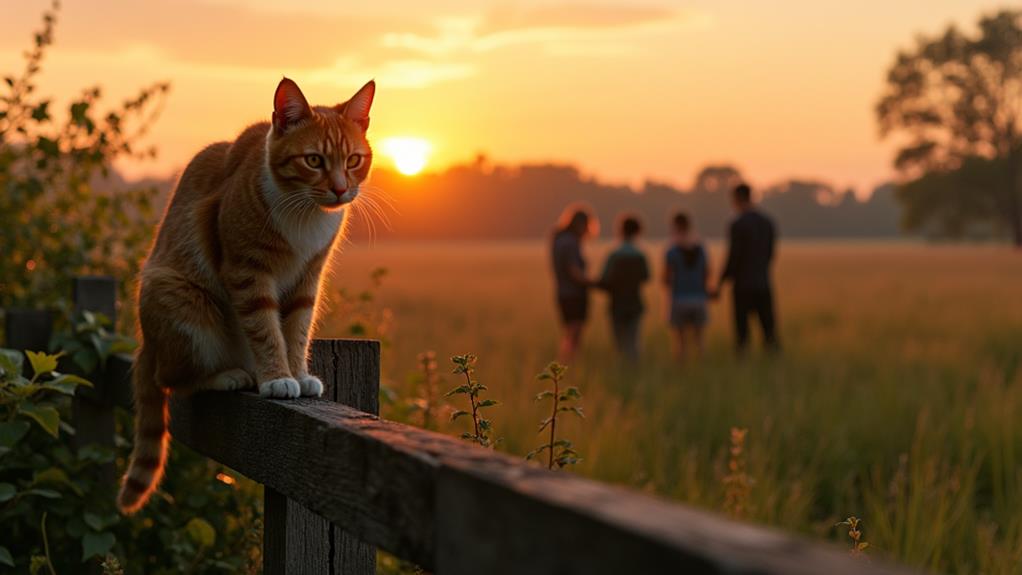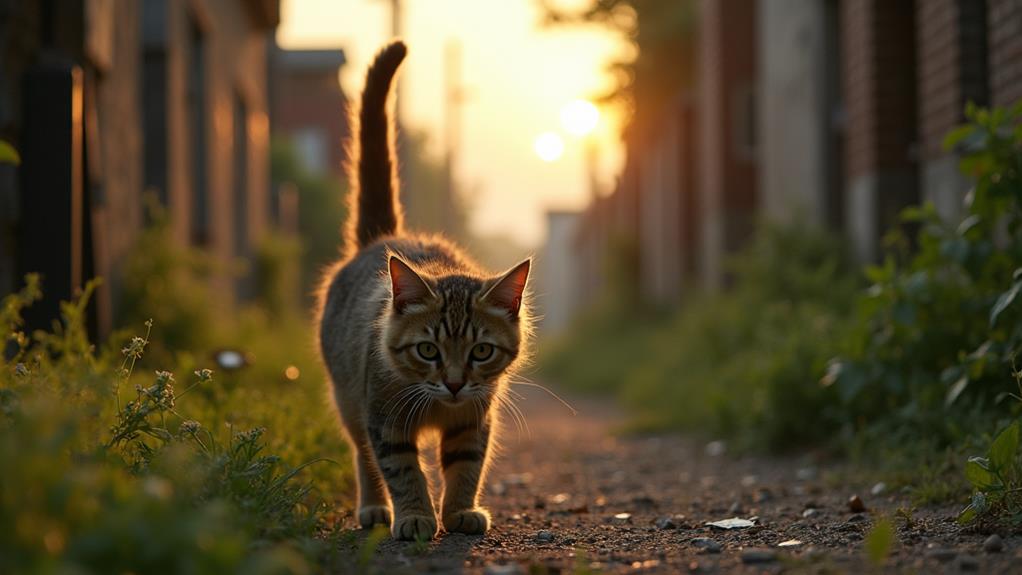How to Feed a Feral Cat: Nutritional Tips and Feeding Guidelines
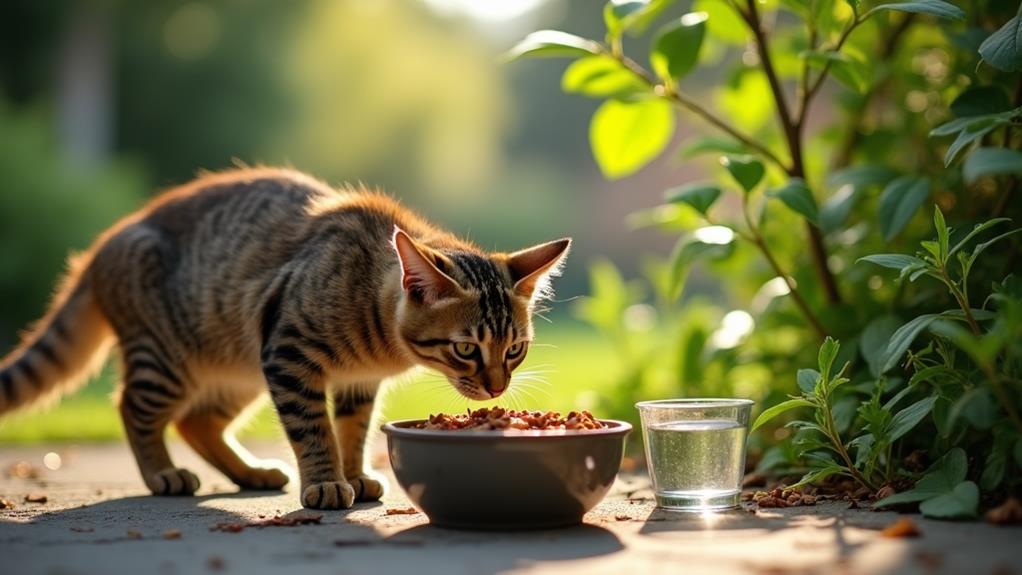
Feeding a feral cat involves some careful planning. They need high-protein cat food to stay strong, and a mix of wet and dry food helps with hydration and dental health. Stick to a regular feeding schedule, like twice daily, to reduce stress and encourage routine behaviors. Avoid offering dog food or table scraps, as these don't meet their dietary needs. Adult feral cats generally require around 200 calories daily, but adjust portions based on the cat's size and activity level. Remove uneaten food after about 30-60 minutes to keep the area clean. There's more to investigate on effective feeding strategies.
Understanding Feral Cat Diets
Feral cats are obligate carnivores, so their diet needs to focus on high-quality proteins found in meat, not carbohydrates or plant-based foods. When you're feeding feral cats, it's vital to provide a balanced mix of wet and dry food. Wet food is particularly significant as it aids in hydration, which is crucial since feral cats often have limited access to fresh water sources. Dry food, on the other hand, is convenient and helps maintain dental health. By offering both, you cater to their dietary needs and support their overall well-being.
Adult feral cats generally require about 200 calories daily, though this can vary based on activity level, maturity, and health status. It's important to adjust portion sizes to guarantee they're getting enough without overfeeding. Stick to a regular feeding schedule to establish routine and stability, which is beneficial for managing a feral colony's health. Always avoid feeding them dog food or human foods, as these lack the specific nutrients cats need. Instead, opt for commercial cat food designed to meet their nutritional requirements. Remember, keeping clean, fresh water available is just as significant as the food you provide.
Essential Nutritional Components
While understanding the dietary habits of feral cats is vital, knowing the specific nutritional components they need is key to their health. A high-protein diet is critical, as feral cats thrive on high-quality meat sources that provide the necessary nutrients for their energy and well-being. Wet food is particularly beneficial because it supplies moisture, helping them stay hydrated, especially if fresh water sources are scarce. Dry cat food can complement their diet, offering convenience and supporting dental health.
To meet their nutritional needs, aim for complete and balanced cat food formulas. These are specifically designed to provide all the vital nutrients without harmful additives. It's important to avoid dog food or human foods, as these can lead to health problems, failing to meet their dietary requirements.
When planning feeding time, consider the calorie needs of adult feral cats, which typically hover around 200 calories per day. This can vary based on maturity, activity level, and environmental factors. Keep in mind:
- High-protein diets guarantee ideal health and energy.
- Wet food provides necessary hydration.
- Complete and balanced cat food meets all nutritional needs.
Providing fresh water regularly is just as significant to prevent dehydration and support overall health.
Dos and Don'ts of Feeding
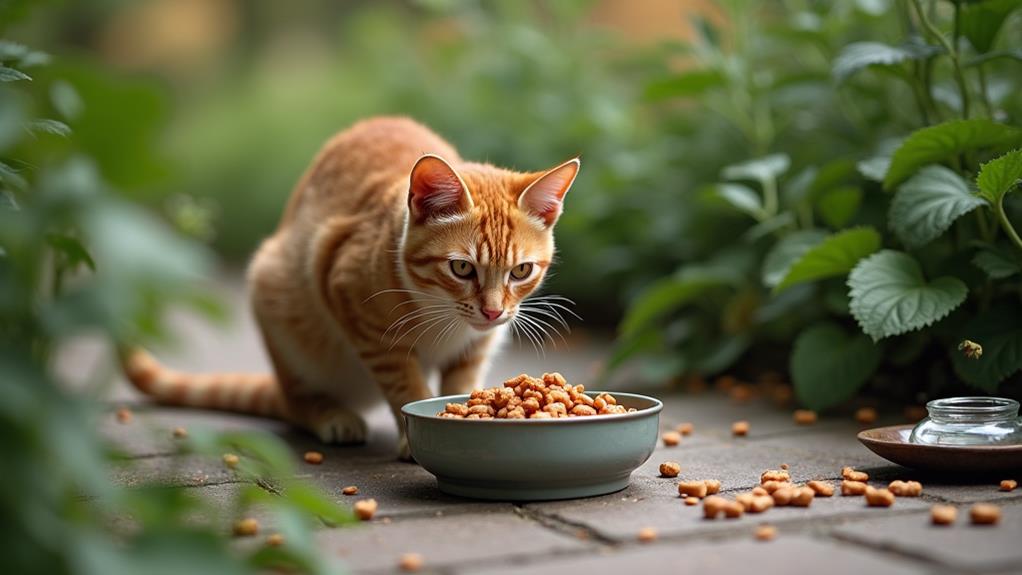
Feeding feral cats involves a few important dos and don'ts to guarantee their health and well-being. Initially, always provide high-quality, protein-rich cat food. Opt for premium wet food since it delivers the necessary nutrients that cats need. This choice not only improves their health but also makes sure they're getting the most out of each meal.
It's crucial to establish a consistent feeding schedule. By offering food at the same times each day, you help the cats learn when to expect meals, promoting regular attendance and reducing stress. Don't make the mistake of feeding cats dog food. It lacks the appropriate nutrients for felines and can lead to health issues over time.
Avoid giving feral cats stale or spoiled food, as it could cause gastrointestinal problems and harm their general well-being. Always check the freshness before serving. Furthermore, monitor food portions and make adjustments as needed. This prevents overfeeding, reduces waste, and guarantees all cats receive adequate sustenance. Keeping an eye on portions offers significant health benefits, as it maintains a healthy weight and improves overall cat health. By following these guidelines, you'll contribute positively to the lives of feral cats.
Feeding Schedule and Portions
Understanding the appropriate feeding schedule and portions is essential to maintaining the health of feral cats. Establishing a regular feeding schedule, such as providing meals twice daily, helps these community cats anticipate when food will be available. This consistency guarantees they receive the nutrition they need. For adult feral cats, aim for about 200 calories per day, using a mix of wet food and dry food. A typical portion might include a small can of wet food along with two ounces of dry food. Adjust these amounts based on individual needs and activity levels.
Monitoring food consumption is vital. Remove any uneaten food after 30-60 minutes to prevent attracting wildlife and to maintain hygiene. Feeding during daylight makes it easier to monitor the cats' presence and health. Keep an eye on their behavior and condition, adjusting portions as necessary.
- Twice Daily Feeding: Create a routine by setting a consistent feeding schedule.
- Caloric Needs: Adult cats need around 200 calories, while kittens require more frequent meals.
- Hygiene Practices: Remove uneaten food promptly and clean the food bowl regularly.
Vitamins and Supplements
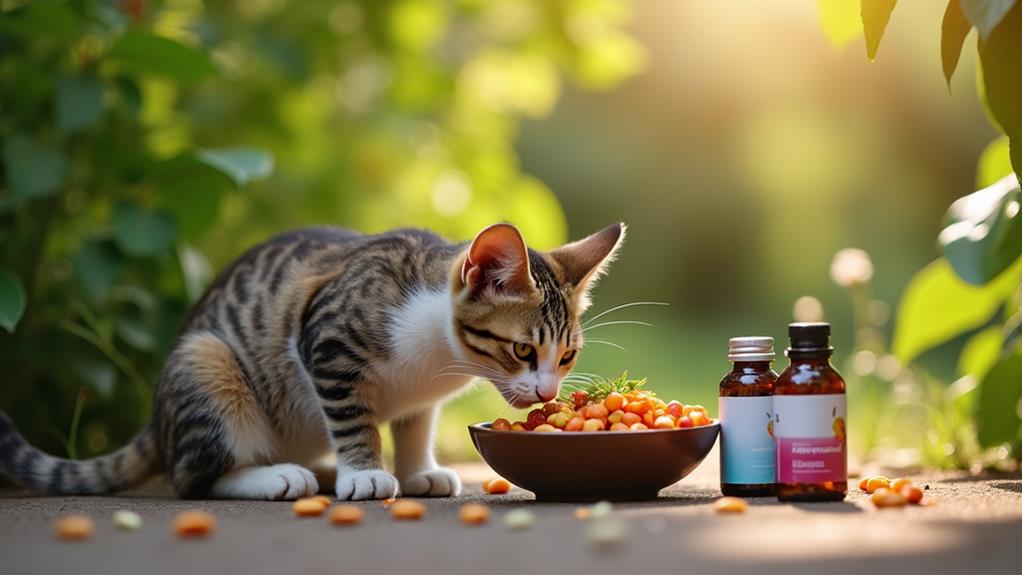
Nourishment extends beyond basic food, and vitamins and supplements can play an significant role in supporting the health of feral cats. Providing the right vitamins can bolster their immune system, particularly during winter and stressful times. Vitamin C is a great choice, enhancing their resilience and general wellbeing. Furthermore, addressing urinary tract issues is imperative for maintaining their health. D-mannose is a supplement that can help prevent urinary tract infections, making it a valuable enhancement to a feral cat's diet.
When considering vitamins and supplements, consult holistic veterinarians to develop a plan tailored to the health needs of your local feral cats. These professionals can guide you in choosing the right supplements and dosages, ensuring you avoid the risks of over-supplementation. Giving too many vitamins or inappropriate doses can negatively affect their health, so it's important to follow expert advice.
Regularly monitoring health and behavior is key to determining if the supplements are effective. Watch for changes in energy levels, coat condition, and general demeanor. This monitoring will help you adjust their nutritional plan as needed, ensuring these community cats receive the best care possible.
Managing Feeding Challenges
One of the key elements to successfully feeding feral cats is establishing regular feeding times. This consistency helps them know when to expect meals, guaranteeing each cat gets its fair share. Set up a dedicated feeding station where you can monitor the amount of food provided. Adjust portions based on how much is eaten to prevent overfeeding and reduce waste, which also deters wildlife from raiding the food.
Clean feeding areas daily to maintain hygiene and minimize pest attraction. This step is essential in keeping the environment safe and healthy for the cats. Invest in weatherproof feeders to protect the food from the elements and prevent wildlife from accessing it. These feeders ensure that feral cats have reliable access to nourishment regardless of weather conditions.
Include a mix of wet and dry food in their diet to meet their nutritional needs. This combination helps cater to their hydration needs and provides balanced nutrition. Remember to feed during daylight hours to align with their natural activity patterns and to prevent nocturnal wildlife from interfering.
- Secure feeding stations: Keeps food safe and accessible
- Daily cleaning: Guarantees a healthy environment
- Mix of food types: Balances nutrition and hydration
Preparing for Seasonal Changes

As you manage feeding challenges with feral cats, it's vital to adapt your approach to account for seasonal changes. In colder months, cats need higher calorie food to maintain warmth. Consider providing dry food to prevent it from freezing. During summer, wet food is a great option as it helps with hydration, significant when temperatures rise. It's key to establish a consistent feeding schedule, choosing a time every day that aligns with daylight hours. This helps feral cats know when to expect meals, especially as daylight hours shift with the seasons.
Water management is another fundamental aspect. Regularly check and refill water sources to guarantee they're accessible and unfrozen in winter. In hotter months, water should be refreshed frequently to keep it cool and drinkable. Besides food and water, offering insulated shelters can provide much-needed protection from harsh weather. These shelters help maintain a reliable food source year-round. By preparing for these seasonal changes, you confirm that the cats remain healthy and well-cared for, regardless of the weather. Adapting your feeding feral practices not only benefits the cats but also makes your efforts more effective.

